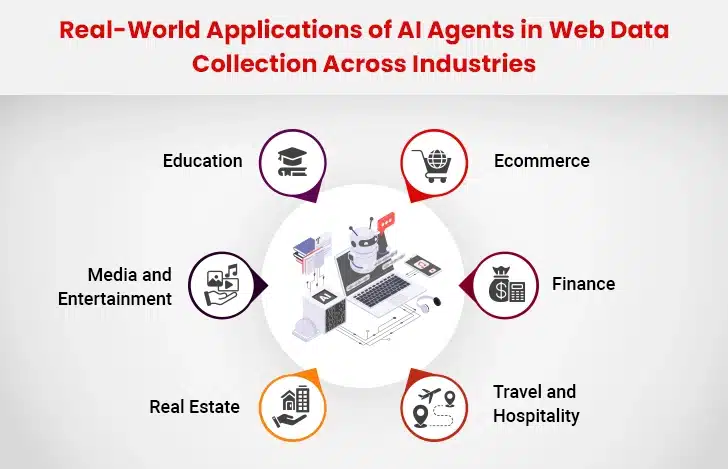For years, people have been using “web scraping” to collect information from websites. But this technique is slow, messy, and breaks easily when websites change. Now, there’s a new way to collect data, and it’s changing everything. Imagine having a super-smart helper that can make a big difference in how users collect data from the web. These helpers are called “AI agents”. They are smarter than traditional scrapers since they can learn and adapt to changes on the web. This means businesses can get the data they need more quickly and reliably. In this detailed piece, we will explore the common challenges of traditional web scraping. The post also highlights the key features and benefits of AI agents for data collection. Lastly, it delves into the challenges and considerations in implementing AI agents.

Table of Contents
Limitations of Traditional Web Scraping
Key Features of AI Agents for Data Collection
Benefits of AI Agents in Web Data Collection
Real-World Applications of AI Agents in Web Data Collection Across Industries
Challenges and Considerations in Implementing AI Agents for Web Data Collection
Limitations of Traditional Web Scraping
Traditional web data scraping comes with several limitations. Here are some common challenges you may face when scraping web data through conventional ways.
1. Dynamic Content
Traditional web scraping struggles with websites that load dynamically. Unlike static webpages, dynamic content requires user actions to appear. Standard scrapers cannot process this and often miss critical information. This limitation makes it hard to scrape modern websites that rely heavily on dynamic elements.
2. Frequent Website Changes
Websites often change their layout or code to improve user experience or prohibit scraping. Even small changes can break a scraper’s functionality. Standard scrapers need constant updates to adapt to these changes. This makes maintaining scrapers time-consuming and resource-intensive.
3. Anti-Scraping Measures
Many websites deploy anti-scraping techniques to detect and block bots. These measures make it tricky for traditional web scrapers to access data without being flagged. Overcoming these barriers often requires advanced techniques or tools, which are beyond the capabilities of standard scrapers.
4. Legal and Ethical Concerns
Scraping data from websites without permission may cause legal problems. Many websites discourage scraping, and breaking their terms can lead to lawsuits. Furthermore, scraping personal data without consent can breach privacy laws. This makes standard web scraping risky for sensitive data.
5. Scalability Challenges
Standard scraping methods struggle to handle extensive data extraction. As the volume of data grows, these methods often face performance issues. This limitation makes them unsuitable for projects requiring continuous or large-scale data collection.
6. Inaccurate Data Extraction
Traditional scrapers may extract incomplete or inaccurate data due to website complexities or errors in parsing HTML content. For instance, small changes in website markup can result in missing fields or incorrect information being captured. This affects the reliability of the extracted data and requires manual corrections.
7. Limited Support for Complex Websites
Websites with advanced features like infinite scrolling or interactive forms are hard for traditional scrapers to handle. These features need special tools to navigate and extract data effectively.
8. High Maintenance
Traditional web scrapers require frequent updates to remain functional. This increases the cost and effort needed to keep scraping operations going.
9. Risk of Overloading Target Websites
If not managed carefully, traditional scrapers can send too many requests in a short time, overloading the target website’s server. This not only disrupts the website’s performance but also risks the scraper being blocked entirely.
10. Dependency on Manual Coding
Traditional scraping often relies on custom coding tailored for specific websites. This makes it inaccessible for users without programming skills and limits its flexibility when dealing with diverse or complex sites.
Key Features of AI Agents for Data Collection
AI agents are widely acclaimed for their remarkable features for data collection. Take a quick look at the key features of AI agents that are helpful in web data scraping.
I. Operate Transparently
AI agents provide visibility into how they collect and process data by explaining their decision-making processes. This builds trust among users by showing why specific actions were taken.
Key Points:
- Offers detailed logs of collected data
- Explains why specific methods were used
- Visualizes progress and results clearly
- Enhances confidence in AI-driven workflows
- Ensures ethical practices through visible processes
II. Dynamic Learning
AI agents constantly learn from new interactions and feedback to improve their performance. For example, they improve their algorithms based on user feedback to enhance accuracy for tasks like extracting specific product categories from online stores.
Key Points:
- Improves accuracy with every interaction
- Adjusts processes based on feedback
- Learns from mistakes to avoid repeating the same
- Becomes more efficient as it processes more tasks
- Stays relevant by evolving with changing requirements
III. Multi-Modal Capabilities
AI agents can collect and process diverse types of data from various sources. For example, they can extract text from PDF files while also analyzing images for visual patterns.
Key Points:
- Processes various data formats like text, images, and videos
- Collects data from multiple channels like websites and documents
- Combines insights from different types of datasets
- Makes it easier to work with non-textual information
- Reduces the need for separate tools to handle different data types
IV. Adapt in Real-Time
AI agents quickly adjust to changes in their environment. For example, if a website changes how it looks, the AI agent will change its approach without needing someone to reprogram it.
Key Points:
- Adapts to changes in website layouts or APIs instantly
- Ensures consistent data collection without downtime
- Identifies and resolves issues during the collection process in real time
- Works effectively with different formats and structures of data sources
- Eliminates frequent manual updates to scraping tools
Decoding the Role of Web Scraping in Driving High-Quality Lead Generation
Benefits of AI Agents in Web Data Collection
AI agents in web data collection offer an array of business benefits. Explore the key benefits that you may harness with AI agents when collecting web data.
1. Automated Data Collection
AI agents make it easy to gather information from multiple sources. They work all the time, so businesses always have access to the latest data without manual effort. This saves time and makes the data collection process faster and more reliable. Furthermore, AI agents let businesses focus on analyzing data, not collecting it. This leads to faster insights and better decisions.
2. Improved Accuracy
AI agents make fewer errors since they use algorithms to process data carefully. Unlike humans who make mistakes when doing the same tasks over and over, AI agents ensure accuracy in web data collection and analysis. This helps businesses make sound decisions based on reliable data, reducing risks from wrong information.
3. Cost Efficiency
AI agents lower costs by automating recurring tasks and reducing manual labor. This allows businesses to use their money and resources more wisely, focusing on important strategies instead of routine tasks. In simple words, the cost-saving benefit makes AI agents a worthwhile investment.
4. Better Business Decisions
AI agents find patterns and trends in data to give actionable recommendations. By using past and present data, businesses can make smarter decisions that align with their goals. This improves planning and makes the business more efficient.
5. Continuous Learning
AI agents improve over time by learning from new data and feedback. This ability allows them to adapt to changing trends without requiring constant reprogramming. As a result, businesses benefit from systems that evolve alongside their needs.
6. Personalization
AI agents use customer data to deliver personalized experiences by identifying preferences and behaviors. This improves customer satisfaction while enhancing engagement through tailored marketing strategies.
7. Risk Mitigation
AI agents help identify potential risks by spotting unusual patterns in data. For example, they can detect fraudulent activities in financial transactions or predict problems in supply chains. This helps businesses avoid losses and ensures things run smoothly.
Fueling FinTechs’ Growth Journey with Web Scraping Services
Real-World Applications of AI Agents in Web Data Collection Across Industries
Deep dive to explore some real-life applications of AI agents in web data collection.

I. Ecommerce
AI agents collect data on customer browsing habits, purchase history, and abandoned carts. This helps businesses offer personalized product recommendations, optimize pricing strategies, and improve user experience. By understanding customer behavior, companies can redefine the shopping experience.
II. Finance
AI agents analyze transaction data, market trends, and news updates to detect fraud, assess risks, and provide investment decisions. They also help financial institutions monitor customer behavior to offer personalized services and improve decision-making.
III. Travel and Hospitality
AI agents collect data on booking patterns, customer reviews, and travel preferences to create personalized travel packages and improve guest experiences.
IV. Real Estate
AI agents analyze market trends, property prices, and buyer preferences to assist in property valuation and real estate market analysis.
V. Media and Entertainment
AI agents gather data on user preferences from streaming platforms or social media to recommend content and analyze audience engagement.
VI. Education
AI agents gather data on student performance through online platforms to create personalized learning paths and identify areas for improvement.
Challenges and Considerations in Implementing AI Agents for Web Data Collection
Implementing AI agents for web data collection faces challenges related to bias, adversarial attacks, costs, transparency, and more. Here’s a more detailed breakdown of the challenges.
1. Bias in Collected Data
Challenge:
AI agents might collect data that over-represents certain groups, leading to biased insights. For example, scraping social media posts from one region might skew market analysis.
Solution:
- Collect data from diverse sources and demographics
- Regularly audit datasets for skewed representation
- Adjust scraping criteria to include underrepresented groups
- Use fairness-checking tools to identify hidden biases
- Combine AI findings with human reviews for balanced insights
2. Integration with Existing Systems
Challenge:
AI agents often need to work with existing systems, but mismatched formats or outdated software can disrupt operations. For example, mismatched formats could delay report generation.
Solution:
- Use universal formats (like CSV) for easy compatibility
- Build APIs to connect AI tools with existing databases
- Test integrations thoroughly before full deployment
- Train staff to handle data across different platforms
- Partner with IT teams to resolve technical gaps
3. Adversarial Attacks and Manipulation
Challenge:
Malicious actors might trick AI agents into collecting fake or harmful data. For example, fake product reviews could mislead sentiment analysis.
Solution:
- Train AI to detect suspicious patterns (e.g., duplicate content)
- Block data from untrusted or spammy websites
- Use human reviewers to verify critical datasets
- Update AI models regularly to recognize new threats
- Implement strict validation rules for incoming data
4. High Implementation Costs
Challenge:
Setting up AI agents requires investment in tools, training, and maintenance. Small businesses might struggle with upfront costs.
Solution:
- Start with pilot projects to test cost-effectiveness
- Use open-source AI tools to reduce software expenses
- Outsource complex tasks to specialized vendors
- Prioritize high-impact data collection goals first
- Monitor ROI to justify scaling up gradually
5. Transparency and Explainability
Challenge:
Users may not trust AI agents if they can’t understand how decisions are made. For example, a vague data source might raise doubts about report accuracy.
Solution:
- Document data sources and collection methods clearly
- Use tools that show how AI agents process information
- Share summaries of data collection processes with stakeholders
- Provide examples of how raw data translates into insights
- Allow users to request details about specific data points
6. Handling Multiple Data Sources
Challenge:
AI agents often retrieve information from various databases, making it challenging to integrate and reconcile differences between sources.
Solutions:
- Use middleware tools for seamless integration of multiple databases
- Develop algorithms that prioritize consistency across different sources
- Implement topical routers to direct queries appropriately within databases
- Create unified schemas for harmonizing diverse datasets into a single format
- Validate merged datasets regularly for errors or mismatches
7. Scalability Issues
Challenge:
As the scope of web data collection grows, AI systems may struggle with scalability, leading to inefficiencies or reduced performance.
Solutions:
- Design modular systems that scale up easily as demand increases
- Use distributed computing frameworks like Hadoop or Spark for scalability
- Optimize codebase regularly for handling larger workloads efficiently
- Employ load balancing techniques across servers during peak usage periods
- Test scalability limits periodically under simulated high-demand conditions
Summing Up
AI agents are transforming the way users collect data from the web. These smart tools can automatically collect data, make quick decisions, and even learn from their mistakes. This means businesses can quickly get the data they need. If you also want to make the most of AI agents, you may seek help from an AI web scraping services provider.





